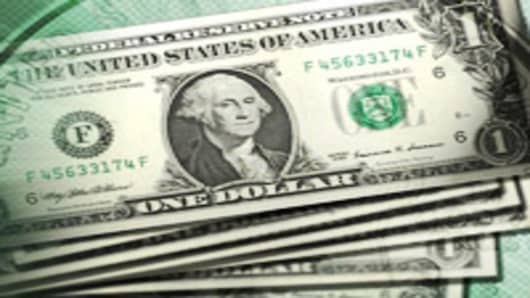A weak dollar contributing to a strong stock market and economy may make investors feel like they're living in some type of Wall Street Bizarro World. But for policymakers, the relationship is just fine for now.
As the US currency continues to set fresh 12-month lows, the stock market is nearing a 12-month high and the economy is back from the brink of disaster.
That's rarely the case in an economy that is seeing normal growth. But in an investing world where up is down and day is night, that's how things may have to stay for a while.
"A weak dollar is boosting everything that's priced in dollars—boosting stocks, even bond prices and especially commodities," says Delta Global Advisors chief economist Michael Pento, who worries over the long-term ramifications of dollar-weakening policies. "What you're seeing now is we've traded long-term growth for a short-term boost in nominal gains."
The Federal Reserve embarked on an aggressive dollar devaluation policy—primarily by slashing interest rates—following the blowup of the financial markets in 2008. The Fed said Wednesday it was continuing to keep its key interest rate near zero and expressed little concern about inflation.
Policy makers have felt it critical, in part, to lower the prices on US assets to get foreign investors to start buying again and inject liquidity back into the financial system.
Foreign demand for US goods is important as domestic consumers weaken under the burdens of surging unemployment and stagnant wages. Thus the need for a weak currency.
Since the trough of the financial crisis stock prices have recovered strongly—more than 50 percent in many indexes—but the dollar has tumbled and commodity prices, particularly oil and precious metals, have soared.
"We've been the big consumer country driving global growth and that's shifted. As a consequence we'll be relying more on our export potential," says Kurt Karl, chief economist at Swiss Re in New York. "For that, a weak dollar is good. But also part of the story for a weak dollar is we don't have the internal demand driving growth as we have in the past."
Investors worried about inflation due to the influx of dollars in the system have been betting against the dollar as well, and there have been calls from other countries to consider replacing the greenback as the international reserve currency.
Money has flowed to the stock market broadly, but specifically in commodity-sensitive stocks and the goods themselves. Oil prices have nearly doubled from their lows late in 2008 while gold has soared to record highs.
Yet some see the trade unwinding at a point in the not too distant future, presenting a challenging climate for investors banking on the weak greenback.
"I can assure you that some time in the near future—I'm not talking about 10 years from now, but in four to six quarters—you will see that inflation left unchecked will destroy the earnings power of corporations and hence lower the return for investors and perhaps even the nominal returns for investors," Pento says.
Some worry that both stocks and commodities are being driven by a trade that is speculative and technical in nature and not supported by fundamentals.
The example of crude rising even as global demand remains soft is one area that has drawn concern.
"There could not be a more lucid anecdotal example of the large amounts of speculative dollars that are flowing through the commodity markets," Mike O'Rourke, chief market strategist at BTIG in New York, wrote in an analysis for clients. "We all know what happens when a trend becomes too obvious. It is usually weeks away from collapsing in on itself."
For now, though, investors have little choice but to follow the trend.
Those who won't want to get into direct currency trades can play the dollar through the PowerShares US Dollar Index Bull ETF that holds long contracts in the greenback against a basket of foreign currencies.
"A weak dollar does work for us," says Kathy Boyle, president of Chapin Hill Advisors in New York. "Foreign investors are just getting out of the dollar because of the global attitude towards it. But at some point everything gets overdone."
That could come sooner than some people think, says Matt Havens, partner in Global Vision Advisors in Hingham, Mass.
Havens thinks a widening trade deficit and higher savings rate will trigger a shortage of dollars that will drive their worth higher.
"The dollar is a reflection of this perception of high inflation," Havens says. "We could be at an inflection point where we see that reverse."
For now, though, the Fed seems intent on keeping interest rates and dollar strength low until the economy recovers. The central bank's governors have made little indication that they are concerned with inflation.
"Exchange-rate depreciation is always the central bank's dirty little secret," Vincent Reinhart, resident scholar at the American Enterprise Institute in Washington, D.C. "You don't mind it in an environment where you've got a lot of slack. You think there are forces that otherwise would keep inflation down.
"Let's face it: Net exports are a source of growth and so the Fed is accepting a little dollar depreciation."
How far the central bank is willing to go down that road is something the market will be watching closely.
"Go long the commodities and go long the market. That could work for another year and a half," Pento says. "We are doing everything wrong that got us in this situation. We're just turning up the volume. It's unmitigated disaster in the long run."



